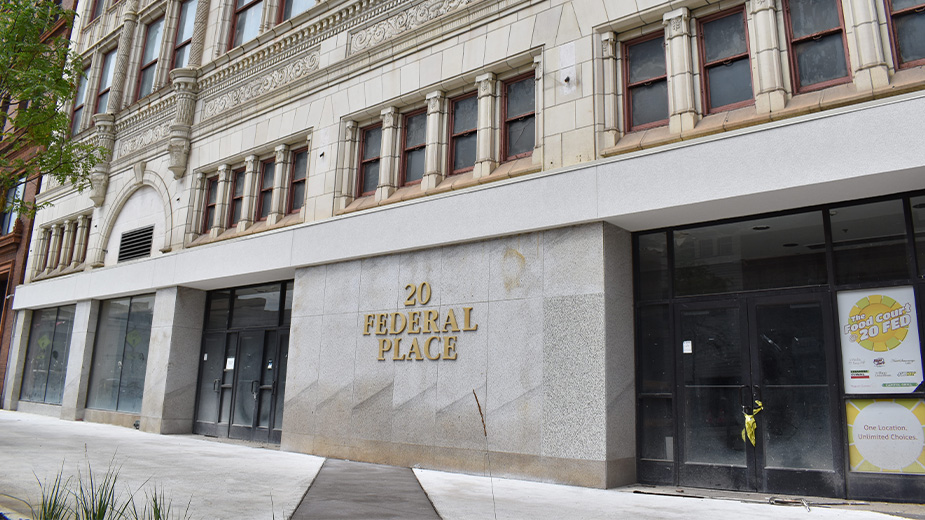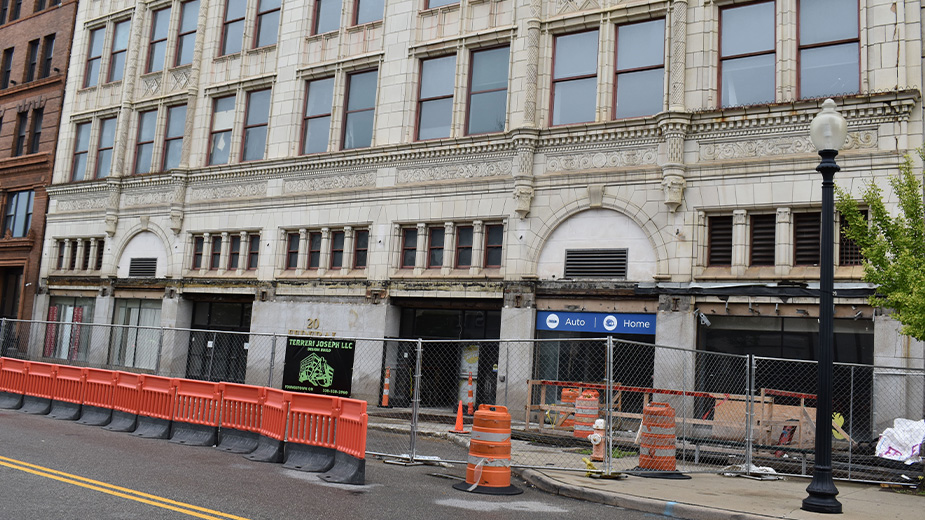City Council Delays Action on Hotel Loan Restructuring
YOUNGSTOWN, Ohio – City Council is expected to vote in two weeks on a request to restructure a loan to the owner of the DoubleTree by Hilton Downtown Youngstown hotel.
Legislation proposed by Mayor Jamael Tito Brown to execute a waiver and amendment agreement between the city and Youngstown Stambaugh Hotel LLC was referred to council’s finance committee. A special meeting of council is expected to be scheduled for March 29.
The legislation calls for restructuring the original loan of $700,000, which the city made to Youngstown Stambaugh in December 2016 and which the hotel partnership has yet to make a payment on.
Under the revised agreement, the new loan from the city, with an outstanding balance of $845,128, which includes interest and penalties from the existing loan, would accrue interest at a 2% annual rate. The hotel owners would pay interest-only payments of $8,451.28 semiannually, July 1 and Jan.1, for the first five years, then twice yearly payments of $25,738.88 for 20 years.
The new loan would mirror the revised terms of the hotel partnership’s $4.9 million loan from the Ohio Water Development Authority, which is contingent on the city agreeing to restructure its loan under the same terms.
The city has until the end of March to approve the agreement, Finance Director Kyle Miasek said. Failing to approve the loan restructuring could trigger a default that could lead to a bankruptcy filing by one of the lenders. A $11.5 million loan from First Commonwealth Bank and the former Chemical Bank has first position on the property.
Youngstown Stambaugh, which Miasek said has been making principal and interest payments on the first position loan, is looking to refinance the remaining $9.4 million owed from that loan under Property Assessed Clean Energy – or PACE – financing. Council approved creation of an energy special improvement district for the hotel in January.
Under the PACE financing, Mahoning County will collect payments twice annually, added to the hotel’s property tax bill, also that will be used to pay off that refinanced debt.
“So the structured loan for all three of the notes will be identical. It’ll just be the amounts will be different, and this will allow for continuity for the hotel to run when it budgets, to understand what its responsibility is each year, under those three loan arrangements, Miasek said.
“If we do not choose to act in this window, we have the potential where the first lien holder could, if they choose to, or the state, or even the city can force the courts to consider bankruptcy because, in essence, one of the three parties could argue that one of the three loan structures has been defaulted on,” Miasek warned.
The delay will give council members more time to get information regarding the hotel’s finances and how much revenue it brings into the city, said 7th Ward Councilwoman Basia Adamczak, finance committee chairwoman.
When council members discussed the proposed amendment during the community planning and economic development committee meeting that took place before the finance committee meeting, there seemed to be “more questions regarding some of the financials,” which Miasek said the administration should be able to provide, Adamczak said.
“The administration has done a pretty good job of explaining everything,” she said. Receiving “just a little bit more of the tangible numbers and even how much revenue the hotel has been bringing into the city” will help council members provide residents “more concrete information on how it’s impacting them directly, rather than just focusing on how it’s impacting downtown,” she said.
Additionally, Adamczak believes it would be better to have the city’s nomination to the improvement district to be approved first. Council voted to appoint Juan Santiago to the ESID board at its meeting.
Administration representatives and council members agreed that the hotel is a key driver for economic activity downtown and throughout the community.
“It’s important for the continued economic development and growth downtown that we have,” Brown said. “At the end of the day, this is a tangible piece that’s working well for us downtown, and it makes sense for us to continue to be a strong partner in this deal.”
Downtown is “the core and the heartbeat of the city,” added Nikki Posterli, Brown’s chief of staff and director of the community planning and economic development department. Income generated downtown goes into the city general fund, which then goes into providing services in the neighborhoods.
Posterli said she and Miasek are constantly vetting developers who are interested in starting businesses in the city, including other hotels. “However, this depends on how we support what’s already here,” she said.
“This hotel is an anchor in our city,” 1st Ward Councilman Julius Oliver said. While he acknowledged the questions and concerns council members might have, he said the jobs the hotel provides are needed and the city benefits from the income tax generated by its payroll, which Miasek put at around $1 million.
Fourth Ward Councilman Mike Ray said there is “no appetite” to see the hotel go into default, but he wanted to be realistic.
“This is a matter of necessity in some ways to make sure this thing continues to operate, but let’s look at the real financial picture,” he said.
Also during the council meeting, which like the committee meetings was held at the Covelli Centre because of safety concerns raised by a recent fire inspection at council chambers, council approved two contracts related to removing low-head dams at three Mahoning River locations.
Council authorized the board of control to spend up to $75,000 to acquire or enter into easement agreements for property needed to access the dams, and to solicit proposals for design and construction contracts to remove the dams at a total cost of $6.2 million. Ohio’s water resource restoration sponsor program is providing $3.2 million with the remaining $3 million coming from the LTV Steel remediation fund.
Removing the dams will help the river clean out the tons of heavy metals and other materials dumped into it when it was used by industry, said Charles Shasho, deputy director of public works. He expects to be able to go for bid on the work by July 4.
“We’re paying it forward for the river now,” Brown said. In addition to the environmental benefits, he acknowledged the river is being looked at as a recreational and economic development asset, and cleaning it provides an opportunity for developers.
Miasek said he expects to have a proposal for another income tax reimbursement agreement to present to council. Last year, the city entered into a similar agreement with Steelite International to move its headquarters here.
The second agreement would be with a company already in the city that is “looking at a major expansion,” Miasek said.
“This is just another way that we help our local businesses stay in our community rather than looking outward and having those resources taken away from us,” Posterli said.
Steelite’s agreement had been expected to go into effect this year, but renovations to its intended space in the Taft Technology Center have been delayed. So the administration will ask council to delay the agreement from going into effect until next year, Miasek said.
Copyright 2024 The Business Journal, Youngstown, Ohio.



